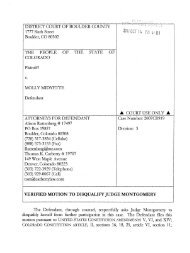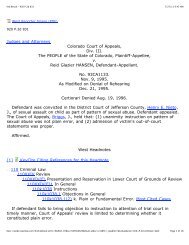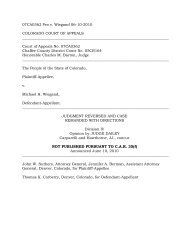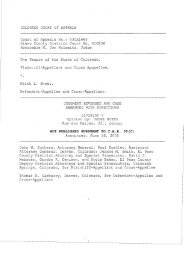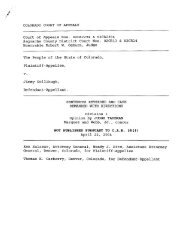People v. Medina, 72 P.3d 405 - Thomas K. Carberry, Criminal ...
People v. Medina, 72 P.3d 405 - Thomas K. Carberry, Criminal ...
People v. Medina, 72 P.3d 405 - Thomas K. Carberry, Criminal ...
- No tags were found...
Create successful ePaper yourself
Turn your PDF publications into a flip-book with our unique Google optimized e-Paper software.
Find Result - <strong>72</strong> <strong>P.3d</strong> <strong>405</strong>7/27/11 9:48 AMWest Reporter Image (PDF)<strong>72</strong> <strong>P.3d</strong> <strong>405</strong>Judges and AttorneysColorado Court of Appeals,Div. III.The PEOPLE of the State of Colorado, Plaintiff-Appellee,v.Andrew MEDINA, Defendant-Appellant.No. 01CA1592.Jan. 30, 2003.Certiorari Denied June 30, 2003.Defendant was convicted in the District Court, El Paso County, <strong>Thomas</strong> K. Kane, J.,of first degree murder, attempted aggravated robbery, conspiracy to commitaggravated robbery, and possession of a handgun by a juvenile. Defendant appealed.The Court of Appeals, Kapelke, J., held, as a matter of first impression, that: (1) trialcourt, in having jury consider only a partial transcript of one codefendant's statementthat focused on comments that incriminated defendant, did not violate rule ofevidence that allows an adverse party to require that party introducing a part of awritten or recorded statement to introduce any other part of statement should be; (2)trial court did not abuse its discretion in denying challenge for cause to prospectivejuror who attended same church as that attended same church as that attended byvictim's family; and (3) trial court did not abuse its discretion by giving jury anabbreviated version of the transcripts of one codefendant's videotaped statements tothe police.Affirmed.West Headnotes[1] KeyCite Citing References for this Headnote311H Privileged Communications and Confidentiality311HIII Attorney-Client Privilege311Hk168 k. Waiver of Privilege. Most Cited Cases(Formerly 410k219(3))The attorney-client privilege is for the personal benefit and protection of the clientand therefore may be waived by the client.https://web2.westlaw.com/find/default.wl?rs=WLW11.07&rp=%2ffind%2fdefault.wl&vr=2.0&fn=_top&mt=Westlaw&cite=<strong>72</strong>+<strong>P.3d</strong>+<strong>405</strong>&sv=SplitPage 1 of 14
Find Result - <strong>72</strong> <strong>P.3d</strong> <strong>405</strong>7/27/11 9:48 AM[2] KeyCite Citing References for this Headnote311H Privileged Communications and Confidentiality311HIII Attorney-Client Privilege311Hk168 k. Waiver of Privilege. Most Cited Cases(Formerly 410k219(3))Any waiver of the attorney-client privilege must be demonstrated by evidence thatthe client, by words or conduct, has expressly or impliedly forsaken his or her claim ofconfidentiality with respect to the information in question and, thus, has consented toits disclosure.[3] KeyCite Citing References for this Headnote311H Privileged Communications and Confidentiality311HIII Attorney-Client Privilege311Hk168 k. Waiver of Privilege. Most Cited Cases(Formerly 410k219(3))Statements initially made in confidence to an attorney lose the shield of theattorney-client privilege if the client knowingly and intentionally discloses them to athird party.[4] KeyCite Citing References for this Headnote311H Privileged Communications and Confidentiality311HIII Attorney-Client Privilege311Hk171 Evidence311Hk173 k. Presumptions and Burden of Proof. Most Cited Cases(Formerly 410k222)The burden of proving the waiver to the attorney-client privilege rests on the partyattempting to overcome the privilege.[5] KeyCite Citing References for this Headnote311H Privileged Communications and Confidentiality311HIII Attorney-Client Privilege311Hk168 k. Waiver of Privilege. Most Cited Cases(Formerly 410k219(3))Defendant's act of authorizing his original attorney to letter he wrote to victim'shttps://web2.westlaw.com/find/default.wl?rs=WLW11.07&rp=%2ffind%2fdefault.wl&vr=2.0&fn=_top&mt=Westlaw&cite=<strong>72</strong>+<strong>P.3d</strong>+<strong>405</strong>&sv=SplitPage 2 of 14
Find Result - <strong>72</strong> <strong>P.3d</strong> <strong>405</strong>7/27/11 9:48 AMfamily waived the attorney-client privilege in regard to letter, and thus letter wasadmissible in murder prosecution.[6] KeyCite Citing References for this Headnote110 <strong>Criminal</strong> Law110I Nature and Elements of Crime110k29 Different Offenses in Same Transaction110k29(5) Particular Offenses110k29(11) k. Robbery and Burglary. Most Cited CasesComplicity and conspiracy are not separate offenses with essentially identicalelements, and thus defendant was properly convicted of offense of conspiracy tocommit an aggravated robbery, and being a complicitor in attempted aggravatedrobbery; while conspiracy was a separate crime, complicity was a theory of culpabilityfor charged crime. West's C.R.S.A. §§ 18-1-603, 18-2-206.[7] KeyCite Citing References for this Headnote110 <strong>Criminal</strong> Law110XXIV Review110XXIV(E) Presentation and Reservation in Lower Court of Grounds of Review110XXIV(E)1 In General110k1030 Necessity of Objections in General110k1030(3) k. <strong>Criminal</strong> Liability. Most Cited CasesDefendant failed to preserve for appellate review his claim that his conviction forattempted robbery must be reversed because the prosecution improperly proceededunder both attempt and conspiracy theories without a proper and clear explanation ofthe difference between conspiracy and attempt, where defendant did not raise suchissue at trial.[8] KeyCite Citing References for this Headnote110 <strong>Criminal</strong> Law110XXIV Review110XXIV(N) Discretion of Lower Court110k1152 Conduct of Trial in General110k1152.2 Jury110k1152.2(2) k. Selection and Impaneling. Most Cited Cases(Formerly 110k1152(2))An appellate court reviews a trial court's ruling on a challenge for cause to ahttps://web2.westlaw.com/find/default.wl?rs=WLW11.07&rp=%2ffind%2fdefault.wl&vr=2.0&fn=_top&mt=Westlaw&cite=<strong>72</strong>+<strong>P.3d</strong>+<strong>405</strong>&sv=SplitPage 3 of 14
Find Result - <strong>72</strong> <strong>P.3d</strong> <strong>405</strong>7/27/11 9:48 AMprospective juror under an abuse of discretion standard. West's C.R.S.A. § 16-10-103(1)(j).[9] KeyCite Citing References for this Headnote110 <strong>Criminal</strong> Law110XXIV Review110XXIV(N) Discretion of Lower Court110k1152 Conduct of Trial in General110k1152.2 Jury110k1152.2(2) k. Selection and Impaneling. Most Cited Cases(Formerly 110k1152(2))The trial court, for purposes of a challenge for cause, is in the best position to viewthe demeanor of a juror claiming impartiality, and the record must affirmativelydemonstrate that the trial court abused its discretion in denying such challenge beforeits decision can be disturbed on appeal. West's C.R.S.A. § 16-10-103(1)(j).[10] KeyCite Citing References for this Headnote110 <strong>Criminal</strong> Law110XXIV Review110XXIV(O) Questions of Fact and Findings110k1158.17 k. Jury Selection. Most Cited Cases(Formerly 110k1158(3))A reviewing court is not to second-guess trial court determinations in denying achallenge a challenge for cause based on a cold record; such deference extends tothe trial court's evaluation of inconsistent or self-contradictory statements. West'sC.R.S.A. § 16-10-103(1)(j).[11] KeyCite Citing References for this Headnote230 Jury230V Competency of Jurors, Challenges, and Objections230k90 k. Relationship to Party or Person Interested. Most Cited CasesTrial court, in murder prosecution, did not abuse its discretion in denying challengefor cause to prospective juror who attended same church as that attended samechurch as that attended by victim's family; prospective juror indicated that he had notformed an opinion about defendant's guilt or innocence and that he agreed that thedefendant is presumed innocent until proved guilty, and prospective juror stated thathe would be able to consider the possibility that the testimony of his pastor, ahttps://web2.westlaw.com/find/default.wl?rs=WLW11.07&rp=%2ffind%2fdefault.wl&vr=2.0&fn=_top&mt=Westlaw&cite=<strong>72</strong>+<strong>P.3d</strong>+<strong>405</strong>&sv=SplitPage 4 of 14
Find Result - <strong>72</strong> <strong>P.3d</strong> <strong>405</strong>7/27/11 9:48 AMwitness, might not be entirely truthful or accurate. West's C.R.S.A. § 16-10-103(1)(j).[12] KeyCite Citing References for this Headnote110 <strong>Criminal</strong> Law110XXIV Review110XXIV(L) Scope of Review in General110XXIV(L)3 Questions Considered in General110k1134.26 k. Mootness. Most Cited Cases(Formerly 110k1134(3))Defendant's claim that trial court abused its discretion in denying his challenge forcause to prospective juror, was rendered moot, where prospective juror wassubsequently excused for job-related reasons.[13] KeyCite Citing References for this Headnote110 <strong>Criminal</strong> Law110XVII Evidence110XVII(P) Documentary Evidence110k431 Private Writings and Publications110k438.1 k. Sound Recordings. Most Cited CasesAccurate transcriptions of sound recordings are admissible to assist the jury infollowing recordings while they are being played.[14] KeyCite Citing References for this Headnote110 <strong>Criminal</strong> Law110XVII Evidence110XVII(P) Documentary Evidence110k431 Private Writings and Publications110k438.1 k. Sound Recordings. Most Cited CasesTrial court did not abuse its discretion in murder prosecution by giving jury anabbreviated version of the transcripts of one codefendant's videotaped statements tothe police; copies of the partial transcript were given to the jury to follow along withthe video testimony, and copies were then collected from the jury.[15] KeyCite Citing References for this Headnote110 <strong>Criminal</strong> Lawhttps://web2.westlaw.com/find/default.wl?rs=WLW11.07&rp=%2ffind%2fdefault.wl&vr=2.0&fn=_top&mt=Westlaw&cite=<strong>72</strong>+<strong>P.3d</strong>+<strong>405</strong>&sv=SplitPage 5 of 14
Find Result - <strong>72</strong> <strong>P.3d</strong> <strong>405</strong>7/27/11 9:48 AM110XVII Evidence110XVII(I) Competency in General110k396 Evidence Admissible by Reason of Admission of Similar Evidence ofAdverse Party110k396(2) k. Admission of Whole Conversation, Transaction, orInstrument Because of Admission of Part or Reference Thereto. Most Cited CasesThe purpose of rule of evidence that allows an adverse party to require that partyintroducing a part of a written or recorded statement to introduce any other part ofstatement which in fairness should be considered contemporaneously with partialstatement, is to avoid creating a misleading impression by taking evidence out ofcontext or otherwise creating a distorted picture by the selective introduction ofevidence. Rules of Evid., Rule 106.[16] KeyCite Citing References for this Headnote110 <strong>Criminal</strong> Law110XVII Evidence110XVII(I) Competency in General110k396 Evidence Admissible by Reason of Admission of Similar Evidence ofAdverse Party110k396(2) k. Admission of Whole Conversation, Transaction, orInstrument Because of Admission of Part or Reference Thereto. Most Cited CasesThe rule of evidence that allows an adverse party to require that party introducinga part of a written or recorded statement to introduce any other part of statementwhich in fairness should be considered contemporaneously with partial statement, issatisfied where the court allows the adverse party the opportunity to introduce theadditional evidence in his or her own case. Rules of Evid., Rule 106.[17] KeyCite Citing References for this Headnote110 <strong>Criminal</strong> Law110XVII Evidence110XVII(I) Competency in General110k396 Evidence Admissible by Reason of Admission of Similar Evidence ofAdverse Party110k396(2) k. Admission of Whole Conversation, Transaction, orInstrument Because of Admission of Part or Reference Thereto. Most Cited CasesTrial court, in having jury consider only a partial transcript of one codefendant'sstatement that focused on comments that incriminated defendant, did not violate ruleof evidence that allows an adverse party to require that party introducing a part of awritten or recorded statement to introduce any other part of statement which inhttps://web2.westlaw.com/find/default.wl?rs=WLW11.07&rp=%2ffind%2fdefault.wl&vr=2.0&fn=_top&mt=Westlaw&cite=<strong>72</strong>+<strong>P.3d</strong>+<strong>405</strong>&sv=SplitPage 6 of 14
Find Result - <strong>72</strong> <strong>P.3d</strong> <strong>405</strong>7/27/11 9:48 AMfairness should be considered contemporaneously with it; defendant was permitted toplay all or any part of videotape concerning his statements he made to police duringcross-examination. Rules of Evid., Rule 106.[18] KeyCite Citing References for this Headnote110 <strong>Criminal</strong> Law110XX Trial110XX(J) Issues Relating to Jury Trial110k863 Instructions After Submission of Cause110k863(1) k. Authority or Discretion of Court. Most Cited CasesA court should give additional instructions whenever they are needed to answer aproper question from the jury unless: (1) the jurors can be adequately informed bydirecting their attention to some portion of the original instructions; (2) the requestconcerns matters not in evidence or does not pertain to the law of the case; or (3)the request would call upon the judge to express an opinion upon factual matters thatthe jury should determine.[19] KeyCite Citing References for this Headnote110 <strong>Criminal</strong> Law110XX Trial110XX(J) Issues Relating to Jury Trial110k863 Instructions After Submission of Cause110k863(2) k. Requisites and Sufficiency. Most Cited CasesTrial court, in responding in the affirmative to the jury's question as to whether thecomplicity instruction applied to attempted robbery charge, was not required toexplain that the theory of defense applied to attempted robbery, as question did notrelate in any way to theory of defense.*407 Ken Salazar, Attorney General, Laurie A. Booras, Assistant Attorney General,Denver, Colorado, for Plaintiff-Appellee.<strong>Thomas</strong> K. <strong>Carberry</strong>, Denver, Colorado, for Defendant-Appellant.Opinion by Judge KAPELKE.Defendant, Andrew <strong>Medina</strong>, appeals the judgment of conviction entered upon a juryverdict finding him guilty of first degree *408 murder, attempted aggravatedrobbery, conspiracy to commit aggravated robbery, and possession of a handgun by ajuvenile. We affirm.The charges stem from an incident in which the victim was shot and killed duringhttps://web2.westlaw.com/find/default.wl?rs=WLW11.07&rp=%2ffind%2fdefault.wl&vr=2.0&fn=_top&mt=Westlaw&cite=<strong>72</strong>+<strong>P.3d</strong>+<strong>405</strong>&sv=SplitPage 7 of 14
Find Result - <strong>72</strong> <strong>P.3d</strong> <strong>405</strong>7/27/11 9:48 AMan attempt to steal his car by defendant and two accomplices. Defendant was fifteenyears old at the time.I.Defendant first contends that the trial court violated his Fifth Amendment privilegeagainst self-incrimination and his Sixth Amendment rights to confrontation andcounsel by admitting a letter he allegedly wrote to the victim's parents and deliveredto his initial counsel. We disagree.[1] [2] The attorney-client privilege is for the personal benefit and protectionof the client and therefore may be waived by the client. Lanari v. <strong>People</strong>, 827 P.2d495 (Colo.1992). “Any waiver must be demonstrated by evidence that the client, bywords or conduct, has expressly or impliedly forsaken his or her claim ofconfidentiality with respect to the information in question and, thus, has consented toits disclosure.” <strong>People</strong> v. Sickich, 935 P.2d 70, 73 (Colo.App.1996).[3] [4] Statements initially made in confidence to an attorney lose the shieldof privilege if the client knowingly and intentionally discloses them to a third party.Lanari v. <strong>People</strong>, supra. The burden of proving the waiver rests on the partyattempting to overcome the privilege. Mountain States Tel. & Tel. Co. v. DiFede, 780P.2d 533 (Colo.1989).[5] Here, before trial, defendant moved to exclude the letter, which contains hisinculpatory statements. Following a hearing, the court denied the motion, finding thatdefendant had waived any privilege.According to testimony adduced at the hearing, defendant placed the letter in anenvelope and gave it to his original attorney. The attorney delivered it to the pastor ofher church. The family of the victim also belonged to that church. The attorney toldthe pastor she wanted him to review the letter and decide whether he should thenforward it to the victim's parents. The attorney testified that she provided the letter tothe pastor “[i]n hopes that it would influence him to assist in ... facilitating ormediating a meeting” between the attorney and the victim's family.The pastor testified that the attorney told him she was acting on defendant'swishes. Eventually, the pastor delivered the letter to the victim's parents, who thenturned it over to the prosecution.In finding that any privilege had been waived by defendant, the court determinedthe prosecution had established that defendant had intended the letter becommunicated to a third party. The court noted the testimony of defendant's originalattorney that it was her desire, as well as that of defendant, that the letter be givento the victim's family and that the attorney wanted input from the pastor to avoidcausing any additional grief to the victim's family. In addition, the court noted thathttps://web2.westlaw.com/find/default.wl?rs=WLW11.07&rp=%2ffind%2fdefault.wl&vr=2.0&fn=_top&mt=Westlaw&cite=<strong>72</strong>+<strong>P.3d</strong>+<strong>405</strong>&sv=SplitPage 8 of 14
Find Result - <strong>72</strong> <strong>P.3d</strong> <strong>405</strong>7/27/11 9:48 AMthe letter had been written by defendant as the final product of a series of drafts,thus indicating that its preparation had been deliberate and not impulsive.At the hearing, the trial court sustained objections to several questions regardingcommunications between defendant and his original attorney concerning the letter. Asa result, the record does not disclose the actual content of those communications.The evidence in the record, however, supports the trial court's findings and also itsultimate ruling that, in authorizing his original attorney to deliver the letter to thevictim's family, defendant thereby waived the attorney-client privilege. We thereforefind no error.At oral argument, defendant's present counsel correctly pointed out that the issueof ineffective assistance of counsel is not raised in this appeal. An ineffectiveassistance claim is better suited for a postconviction proceeding pursuant to Crim. P.35(c). Further, at an evidentiary hearing on such a motion, the reasons for andpossible strategic purposes of original counsel's actions regarding the letter could bedisclosed and evaluated,*409 and the content of the communications betweendefendant and that attorney regarding the letter might be brought to light.II.In his opening brief on appeal, defendant contended that the trial court violated hisright to testify by giving him an improper advisement concerning that right. In hisreply brief, however, defendant withdrew the issue from consideration in light of<strong>People</strong> v. Blehm, 983 P.2d 779 (Colo.1999)(a claim of inadequate advisement ondefendant's right to testify should be raised in postconviction motion so that courtmay determine whether the advisement actually had an adverse effect on thedefendant's decision whether to testify). Accordingly, we do not address thecontention in this appeal.III.Defendant contends that because the trial court instructed the jury on bothconspiracy and complicity, which according to defendant have essentially the sameelements, and because it cannot be determined whether the jury found him guilty asa conspirator or as a complicitor, the trial court erred by imposing a class 1 felonysentence, rather than a class 2 felony sentence as would be required for a convictionunder the conspiracy statute. We disagree.[6] Contrary to defendant's assertions, complicity and conspiracy are notseparate offenses with essentially identical elements. The complicity statute makes aperson “legally accountable as principal for the behavior of another constituting acriminal offense if, with the intent to promote or facilitate the commission of theoffense, he or she aids, abets, advises, or encourages the other person in planning orcommitting the offense.” Section 18-1-603, C.R.S.2002. Thus, complicity is not ahttps://web2.westlaw.com/find/default.wl?rs=WLW11.07&rp=%2ffind%2fdefault.wl&vr=2.0&fn=_top&mt=Westlaw&cite=<strong>72</strong>+<strong>P.3d</strong>+<strong>405</strong>&sv=SplitPage 9 of 14
Find Result - <strong>72</strong> <strong>P.3d</strong> <strong>405</strong>7/27/11 9:48 AMseparate offense at all, but rather a theory of culpability for the charged crime.In contrast, conspiracy is a separate crime. Conviction of conspiracy generallyrequires a sentence one class lower than that for the target offense of the conspiracy.Section 18-2-206, C.R.S.2002.Here, defendant was convicted of conspiracy to commit an aggravated robbery andalso as a complicitor in the attempted aggravated robbery. The conspiracy and theattempted aggravated robbery convictions are thus for separate offenses. <strong>People</strong> v.Hood, 878 P.2d 89 (Colo.App.1994). Accordingly, we find no error.[7] In his reply brief, defendant for the first time additionally contends that hisconviction for attempted robbery must be reversed because the prosecutionimproperly proceeded under both attempt and conspiracy theories “without a properand clear explanation of the difference between conspiracy and attempt.” Because thisargument is raised for the first time in the reply brief, we decline to consider it. See<strong>People</strong> v. Czemerynski, 786 P.2d 1100 (Colo.1990).IV.Defendant contends that the trial court violated his constitutional right to a fair andimpartial jury by improperly denying two challenges for cause. We disagree.The trial court must sustain a challenge for cause to a prospective juror who has astate of mind evincing enmity or bias toward the defendant. However, no juror shallbe disqualified because of a previously formed or expressed opinion about thedefendant's guilt or innocence so long as the court is satisfied from the examinationof the juror that he or she will render an impartial verdict according to the law andthe evidence submitted to the jury at trial. Section 16-10-103(1)(j), C.R.S.2002.[8] [9] We review a trial court's ruling on a challenge for cause to aprospective juror under an abuse of discretion standard. Carrillo v. <strong>People</strong>, 974 P.2d478 (Colo.1999). “The trial court is in the best position to view the demeanor of ajuror claiming impartiality, and the record must affirmatively demonstrate that thetrial court abused its discretion before its decision can be disturbed on appeal.” <strong>People</strong>v. Christopher, 896 P.2d 876, 878 (Colo.1995).[10] A reviewing court is not to second-guess trial court determinations in thisregard*410 based on a cold record. Carrillo v. <strong>People</strong>, supra. This deference extendsto the trial court's evaluation of inconsistent or self-contradictory statements.Morrison v. <strong>People</strong>, 19 <strong>P.3d</strong> 668 (Colo.2000).A.Defendant's first challenge for cause involved a juror who attended the samechurch as that attended by the victim's family.https://web2.westlaw.com/find/default.wl?rs=WLW11.07&rp=%2ffind%2fdefault.wl&vr=2.0&fn=_top&mt=Westlaw&cite=<strong>72</strong>+<strong>P.3d</strong>+<strong>405</strong>&sv=SplitPage 10 of 14
Find Result - <strong>72</strong> <strong>P.3d</strong> <strong>405</strong>7/27/11 9:48 AM[11] In voir dire, the juror initially stated that, based on conversations withfellow parishioners, he had already formed an opinion concerning defendant's guilt.Upon additional questioning, however, the juror changed his answer, indicating thathe had not formed an opinion about defendant's guilt or innocence and that heagreed that the defendant is presumed innocent until proved guilty. The juror alsostated that he would be able to consider the possibility that the testimony of hispastor, a witness, might not be entirely truthful or accurate. In later questioning, hestated that he could not imagine such a scenario.The trial court concluded that, based on the totality of the voir dire, the juror wasopen to deciding issues of credibility concerning the pastor's testimony. The courttherefore denied the challenge for cause. The record does not affirmativelydemonstrate that the trial court abused its discretion in arriving at its determination.Therefore, we find no manifest error.B.[12] With respect to the challenge for cause to the second juror, we agree withthe <strong>People</strong> that because the juror was eventually excused for job-related reasonsbefore the exercise of any peremptory challenges, the issue is moot.In view of our conclusion that defendant has not shown error in the court's rulingson his challenges for cause, we need not address the parties' related argumentsconcerning exhaustion of peremptory challenges.V.Defendant contends that the trial court erred by giving the jury an abbreviatedversion of the transcripts of one codefendant's videotaped statements to the police.We disagree.A.[13] “Accurate transcriptions of sound recordings are admissible to assist thejury in following recordings while they are being played....” <strong>People</strong> v. Coca, 40Colo.App. 440, 443, 580 P.2d 1258, 1260 (1978).[14] Here, copies of the partial transcript were given to the jury to follow alongwith the video testimony. The copies were then collected from the jury. Unlike in<strong>People</strong> v. Montoya, 773 P.2d 623 (Colo.App.1989), the jury was not allowedunsupervised or repetitive viewing of the video during deliberations.B.Defendant next asserts that the court erred and violated CRE 106 by allowing thejury to consider only a partial transcript of one codefendant's statement that focusedon comments that incriminated defendant. We disagree.https://web2.westlaw.com/find/default.wl?rs=WLW11.07&rp=%2ffind%2fdefault.wl&vr=2.0&fn=_top&mt=Westlaw&cite=<strong>72</strong>+<strong>P.3d</strong>+<strong>405</strong>&sv=SplitPage 11 of 14
Find Result - <strong>72</strong> <strong>P.3d</strong> <strong>405</strong>7/27/11 9:48 AMCRE 106 states:When a writing or recorded statement or part thereof is introduced by a party, anadverse party may require him at that time to introduce any other part or any otherwriting or recorded statement which ought in fairness to be consideredcontemporaneously with it.Because no reported Colorado decisions address this issue under CRE 106, we look tofederal cases interpreting Fed.R.Evid. 106, its identical counterpart. The federal caselaw interpretations are persuasive. Forbes v. Goldenhersh, 899 P.2d 246(Colo.App.1994).[15] [16] The purpose of Rule 106 is to avoid creating a misleadingimpression by taking evidence out of context or otherwise creating a distorted pictureby the selective introduction of evidence. Merrick v. Mercantile-Safe Deposit & TrustCo., 855 F.2d 1095 (4th Cir.1988); see United States v. Jamar, 561 F.2d 1103 (4thCir.1977). The *411 rule is satisfied where the court allows the adverse party theopportunity to introduce the additional evidence in his or her own case. United Statesv. Branham, 97 F.3d 835 (6th Cir.1996).[17] Here, defendant objected to distribution of the partial transcript because itwas incomplete and unduly highlighted portions of the codefendant's statement.Defendant also objected to playing the entire videotape and providing the entiretranscript because they contained inadmissible evidence that should have beenredacted.The court ruled the partial transcript and videotape admissible and stated thatdefendant could offer any portion of the videotape he wished during crossexamination.Because defendant was permitted to play all or any part of the videotape duringcross-examination, he had the ability to place the partial version of the tape incontext. Accordingly, no violation of CRE 106 occurred.VI.Defendant contends that the trial court erred by giving an improper response to thejury's question as to whether the complicity instruction applied to attempted robbery.Specifically, defendant urges that the court should have explained that the theory ofdefense applied to attempted robbery. We disagree.[18] A court should give additional instructions whenever they are needed toanswer a proper question from the jury unless: (1) the jurors can be adequatelyinformed by directing their attention to some portion of the original instructions; (2)https://web2.westlaw.com/find/default.wl?rs=WLW11.07&rp=%2ffind%2fdefault.wl&vr=2.0&fn=_top&mt=Westlaw&cite=<strong>72</strong>+<strong>P.3d</strong>+<strong>405</strong>&sv=SplitPage 12 of 14
Find Result - <strong>72</strong> <strong>P.3d</strong> <strong>405</strong>7/27/11 9:48 AMthe request concerns matters not in evidence or does not pertain to the law of thecase; or (3) the request would call upon the judge to express an opinion upon factualmatters that the jury should determine. Copeland v. <strong>People</strong>, 2 <strong>P.3d</strong> 1283 (Colo.2000).[19] Here, during deliberations, the jury submitted this question: “Doesinstruction 20 (complicitor) apply to the charge of Attempt to Commit AggravatedRobbery (Instructions 16 and 17) in that does the Defendant need to be holding agun?” The trial court replied: “Yes. Instruction 20 does apply to the charge of Attemptto Commit Aggravated Robbery. The instructions are to be considered together as awhole. The Court cannot answer questions that involve the application of facts to thelaw.”This response is legally accurate and does not purport to answer any factualquestion. Because the jury question did not relate in any way to the theory ofdefense, there was no need for the court to mention it again in its response. Wetherefore find no error.The judgment is affirmed.Judge NEY and Judge NIETO, concur.Colo.App.,2003.<strong>People</strong> v. <strong>Medina</strong><strong>72</strong> <strong>P.3d</strong> <strong>405</strong>Judges and Attorneys (Back to top)Judges | AttorneysJudgesKane, Hon. <strong>Thomas</strong> KellyState of Colorado District Court, 4th Judicial DistrictColorado Springs, Colorado 80903Litigation History Report | Judicial Reversal Report | ProfilerKapelke, Hon. Robert J.State of Colorado Court of AppealsDenver, Colorado 80202Litigation History Report | Judicial Reversal Report | ProfilerNey, Hon. Peter H.State of Colorado Court of AppealsDenver, Colorado 80202Litigation History Report | Judicial Reversal Report | Profilerhttps://web2.westlaw.com/find/default.wl?rs=WLW11.07&rp=%2ffind%2fdefault.wl&vr=2.0&fn=_top&mt=Westlaw&cite=<strong>72</strong>+<strong>P.3d</strong>+<strong>405</strong>&sv=SplitPage 13 of 14
Find Result - <strong>72</strong> <strong>P.3d</strong> <strong>405</strong>7/27/11 9:48 AMNieto, Hon. Henry E.State of Colorado Court of AppealsDenver, Colorado 80202Litigation History Report | Judicial Reversal Report | ProfilerAttorneysAttorneys for Defendant<strong>Carberry</strong>, <strong>Thomas</strong> KarelDenver, Colorado 80223Litigation History Report | ProfilerAttorneys for PlaintiffBooras, Hon. Laurie A.Unknown StateLitigation History Report | ProfilerSalazar, KenDenver, Colorado 80203Litigation History Report | ProfilerEND OF DOCUMENTWest Reporter Image (PDF)Adobe Reader is required to view PDF images.(c) 2011 Thomson Reuters. No Claim to Orig. US Gov. Works.https://web2.westlaw.com/find/default.wl?rs=WLW11.07&rp=%2ffind%2fdefault.wl&vr=2.0&fn=_top&mt=Westlaw&cite=<strong>72</strong>+<strong>P.3d</strong>+<strong>405</strong>&sv=SplitPage 14 of 14









